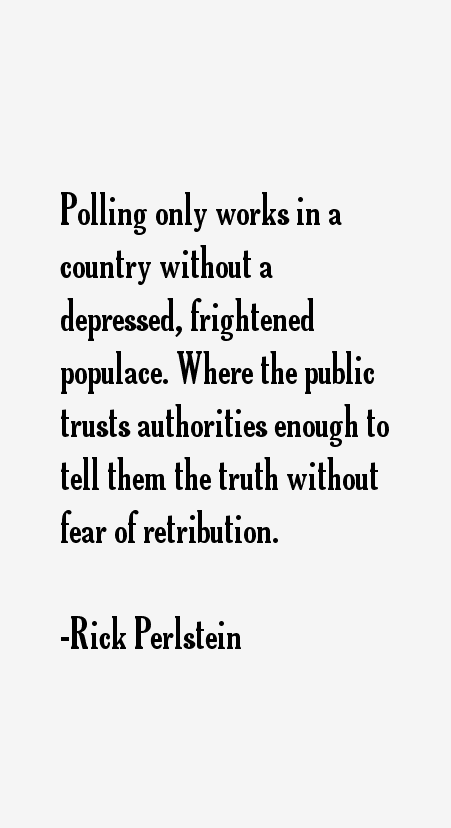Rick Perlstein Quotes & Sayings (Page 2)
Rick Perlstein quotes and sayings page 2 (historian). Here's quote # 11 through 20 out of the 100 we have.
“In Ronald Reagan's chaotic childhood, the imagination was armor. There is nothing unusual about that; transcending the doubts, hesitations, and fears swirling around you by casting yourself internally as the hero of your own adventure story is a characteristic psychic defense mechanism of the Boy Who Disappears.”

“It is a quirk of American culture that each generation of nonconservatives sees the right-wingers of its own generation as the scary ones, then chooses to remember the right-wingers of the last generation as sort of cuddly.”
“Liberals tend to stress how marvelous education is, in and of itself, and also adore it as a vessel for genuine equality. (That's me, by the way: Hell, I think we should be spending $50 billion a year to make college education free).”

“Polling only works in a country without a depressed, frightened populace. Where the public trusts authorities enough to tell them the truth without fear of retribution.”
“Prediction is structurally inseparable from the business of punditry: It creates the essential image of indefatigable authority that is punditry's very architecture; it flows from that calcified image, and it provides the substance for the story that keeps getting told about the inevitability of American progress.”

“Richard M. Nixon honestly believed in his bones that an organized conspiracy of liberal media insiders had literally been plotting against him ever since he broke Alger Hiss in 1948 (he never shifted course, and lost his soul).”
“Sociologists in the 1960s, reaching for an explanation of why cities were burning, often spoke of the problem of 'rising expectations.' It wasn't that the times were especially miserable for blacks, or even that the neighborhoods that rioted were the most uninhabitable ones. Watts was a neighborhood of neat bungalows and well-tended lawns.”

“The argument that John F. Kennedy was a closet peacenik, ready to give up on what the Vietnamese call the 'American War' upon re-election, received its most farcical treatment in Oliver Stone's 'JFK.'”
“The reason inflation was brought down to manageable levels, by the time of Ronald Reagan's re-election, was directly attributable to Jimmy Carter's very courageous act, hiring a Federal Reserve chair, with the charge to induce a recession. That recession was probably the reason he didn't win a second term.”
“Here is a truism about the psychology of politicians: there is almost nothing so soul-definingly traumatic for them as losing an election. You believe yourself a great man, a figure of destiny. You love your job, or covet an even more important one - and then suddenly one day it's gone, all because the public decides it doesn't love you any more.”
Rick Perlstein Quotes Rating
No Ratings Yet
Leave A Comment
























